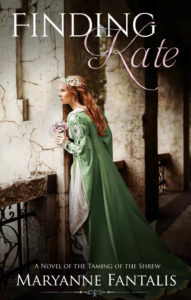Local author finds inspiration in CSF’s “Shrew”
Maryanne Fantalis’ book “Finding Kate,” based on the Shakespeare play, is on sale now.
J.K. Rowling was trapped on a delayed train when the idea for “Harry Potter” came to her. For E.B. White, author of “Charlotte’s Web,” inspiration struck when he found a large, intricate cobweb in his house. All J.R.R. Tolkein needed to start “The Hobbit” was a blank piece of paper and a made-up word.
For Maryanne Fantalis, the great “a-ha” moment came from a night of Shakespeare under the stars.
Seven years ago, the author and CU Boulder writing and rhetoric lecturer attended a production of “The Taming of the Shrew” so inspiring that it ignited the idea for her next novel. The book, “Finding Kate,” was released in print and e-book form earlier this year.
“Some of those moments in the play spoke to me,” Fantalis says. “I thought, ‘I have to get into this, I have to explore this.’”
Fantalis has attended the Colorado Shakespeare Festival every summer since 2006. In fact, she and her friends have made their girls’ night out at the Mary Rippon Outdoor Theatre an annual tradition. She’d always written off “The Taming of the Shrew,” assuming its narrative didn’t really fit into modern times—but when CSF planned to stage it in 2010, she decided to give it a try.
“Within the first couple of scenes,” she says, “I was blown away … entranced.”
Fantalis says she saw things in the play she’d never seen before—namely that Kate isn’t so much a “shrew” as a woman grown understandably bitter from a lifetime of being given short shrift.
“She’s developed this armor of defensiveness,” Fantalis says. “Everybody around her is so awful to her. She and her sister, they have this ongoing war of words. When her father sees them arguing, he immediately assumes it’s all Kate’s fault. This gets carried out into the neighborhood; everyone treats her that way.
 “Imagine living with that for 18 or 20 years. What do you think is going to happen? You’re going to hit them verbally before they hit you. ‘You call me a shrew? I’ll show you a shrew.’”
“Imagine living with that for 18 or 20 years. What do you think is going to happen? You’re going to hit them verbally before they hit you. ‘You call me a shrew? I’ll show you a shrew.’”
For the first time ever, Fantalis also saw in Shakespeare’s words the unfolding of a real love story—not the story of a man wielding power over a woman without her consent.
She credits director Stephanie Shine and lead actor Augustus Truhn for turning Petruchio’s “taming” into a sweet plea for Kate’s hand.
“He played it as if his character thought, ‘Kate’s amazing, but she’ll never believe me if I just tell her she’s amazing.’ So he mirrors her actions and lets zingers fly until she realizes, ‘Okay, maybe there’s something else going on here.’ That idea got its hooks in me.”
She wanted to write a book based on this newly framed relationship between Kate and Petruchio … and she wanted to set it in 1485, just as the sun set on the Middle Ages and the Wars of the Roses. In this new era, Richard III had fallen, Henry Tudor was on the throne, and the English Renaissance had begun.
It may seem counterintuitive to set a Shakespearean story in a period before Shakespeare was born. But Fantalis, a scholar in medieval literature and history, points out that the term “shrew” actually comes from the Middle Ages: It was a character archetype in mystery plays and literature from that time.
“Shakespeare might have been drawing from dramatic tradition by creating a ‘shrew,’ but I think he also intentionally confounded their expectations. Petruchio always urges Kate not to be what people expect. Shakespeare didn’t create the shrew a lot of people expected.”
Fantalis has always been fascinated by the way Shakespeare traveled several centuries back in time for story ideas but simultaneously created female characters who were ahead of their time.
“His women get all the best lines,” she says. “They get the happy endings. I think he respected women a lot and recognized that they were intelligent. His female characters are multidimensional in a way that sometimes the men are not.”
She’s planning for “Finding Kate” to be the first in a series of historical fiction focused on the women of Will. Other books will focus on female protagonists in “Much Ado About Nothing,” “Twelfth Night” and “Measure for Measure,” among others.
Despite the historical setting she uses, Fantalis believes any contemporary woman can see a bit of herself in Shakespeare’s leading ladies.
“The thing that still amazes me, as long as I’ve been studying history and human behavior, is that human relationships don’t change,” she says. “Whether it’s the 1400s or the 2000s, people are people. That’s why historical fiction still resonates, and that’s why Shakespeare is so relevant today.”
“The Taming of the Shrew” returns to the Rippon stage starting Sunday, June 11.